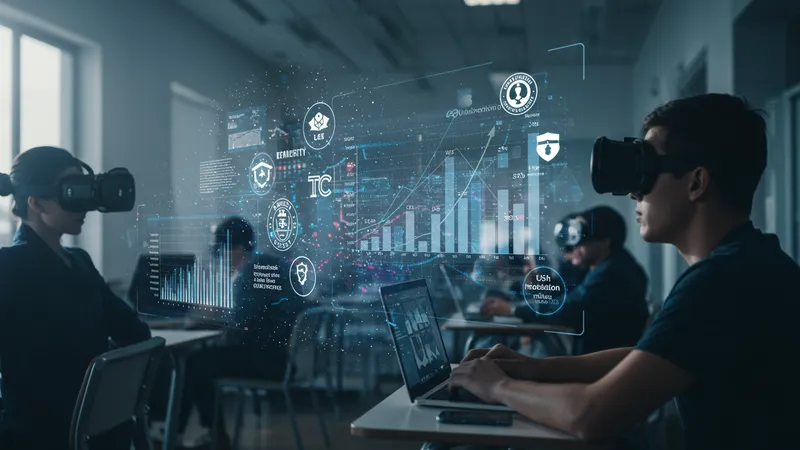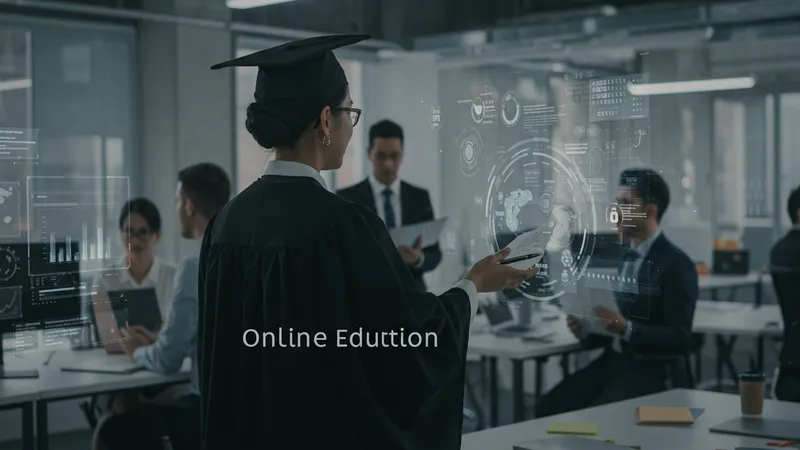


Did you know that some online degrees are now more valuable than traditional ones? It’s true, and the implications for your future could be life-changing. The age of digital education is here, and it’s exploding with possibilities.
The demand for flexibility and specialized skills has skyrocketed, making online degrees more relevant than ever. With top universities and platforms joining the race, the online degree experience is being redefined, and it could reshape your career trajectory.

Surprisingly, some of these courses are even more rigorous than their on-campus counterparts—offering unprecedented access to professors and resources. But here’s the kicker: online graduates often report higher satisfaction with their learning experience. But that’s not even the wildest part…
Shockingly, employers are beginning to respect online degrees as much as traditional ones. Companies are valuing the self-discipline and motivation required to succeed online. In some sectors, an online qualification now outshines its face-to-face rival. What happens next shocked even the experts…
In today’s competitive job market, owning an online degree often means you possess cutting-edge skills. Specialty areas like technology and business analytics are in high demand, and online courses are updating content faster than traditional curricula. But there's one more twist to the tale of online education's value…

The lower costs associated with online learning translate into less student debt—a massive advantage in a world where education costs are spiraling. Students can save on average 60% on tuition, creating financial flexibility unheard of with brick-and-mortar schooling. What you read next might change how you see education expenses forever.
Moreover, online degrees offer unparalleled flexibility. Whether you’re working full-time, raising a family, or both, you can learn at your own pace—a freedom traditional students only dream of. Yet, the convenience is just the tip of the iceberg…
Innovative learning environments such as immersive VR classrooms and AI-driven personal tutors are redefining the education landscape. But more surprising is their extraordinary impact on student engagement and retention. The next revelation might just redefine your understanding of what learning can be.
Many are surprised to learn that online degrees often offer more networking opportunities than traditional programs. Global virtual classrooms allow you to connect with peers worldwide, providing access to diverse perspectives and career connections. But there's an unexpected edge to this digital interaction…

Online students frequently engage in collaborative projects, building soft skills that translate directly to workplace success. You might even meet future business partners or lifelong friends. Yet, one of the biggest surprises is the alumni networks—powerful and often more accessible than you might expect.
Social media and professional platforms like LinkedIn enhance these networks, giving you direct access to industry leaders, innovators, and even potential employers. The opportunities are vast, but there is an unexpected caveat to consider…
With these expanded networks comes the responsibility to manage online identities and reputations strategically. This requires a mastery of digital etiquette and personal branding that few traditional students develop at the same pace. But the next twist might just redefine the limits of online connections.
One fascinating aspect of online education is the innovative teaching methods employed. AI and machine learning personalize the journey, tailoring content to your strengths and weaknesses. It’s a transformative approach that leaves the traditional lecture in the dust. But the surprises don’t stop there…

Gamification, where education mimics game dynamics, is increasing learner engagement and retention dramatically. Students often find themselves more motivated, with completion rates skyrocketing. Yet, this digital playbook holds more secrets to uncover.
Not only does the modern virtual classroom facilitate engaging content, but adaptive quizzes and simulations also provide real-time feedback—guiding learners just as a personal mentor would. But the elements of surprise in this new pedagogy extend beyond mere academic success…
The integration of Augmented Reality (AR) and Virtual Reality (VR) offers a visceral, immersive experience that was once the realm of science fiction. The potential for these tools to revolutionize education is immense, and what you learn next might just astound you.
Graduating with an online degree signals to employers that you are tech-savvy and adaptable—crucial traits in today’s digital-first world. Companies are eager to hire individuals who can navigate new technologies seamlessly. But as you’ll see, there’s a twist to this trend…

Online graduates often outperform in team-based environments, thanks to the collaborative technologies integral to their education. The transition from virtual meetings to in-person collaborations is smoother than expected, but that’s just one facet of the story.
Surprisingly, some graduates report higher initial salary offers compared to their traditional counterparts, given the advanced, applicable skills they've developed in digital environments. Yet, as appealing as this sounds, there’s a competitive edge yet to be revealed…
The flexibility of online learning equips students with unparalleled time-management skills, an irresistible asset for growth-focused employers. The next section may be the most surprising yet, uncovering strategies for leveraging this asset in the job market.
Once seen as lesser than campus degrees, the perception of online education is rapidly shifting. Top-rated programs are earning respect among hiring managers, gaining a reputation for excellence. But a lingering misconception still surprises many…

Some employers worry about the quality of online degrees. However, the best programs have rigorous accreditation, equivalent to their in-person counterparts. Uncover the hidden story behind these trusted credential mechanisms and explore unknown paths.
To overcome skepticism, many students are showcasing portfolios of project work and internships, demonstrating their skills' real-world impact. The next revelation might surprise you: the unique advantages of these proactive approaches.
The evolution of 'micro-credentials'—bite-sized qualifications recognized widely—enables learners to demonstrate expertise in specific areas while holding a full degree. This twist could change the face of education credentialing forever.
Students often wonder: will my online degree be recognized internationally? Increasingly, the answer is yes, thanks to partnerships among educational institutions across the globe. Such affiliations increase the degree's value in the global market—all the more intriguing given the following developments…

The ease of credit transfers between partner institutions means students can complete degrees from multiple globally recognized schools, bolstering their credentials. What this collaboration means for cross-border education is astounding.
Large companies are starting to treat online degrees from reputable universities as equal—if not superior—90% report no preference once the institution accrediting the degree is recognized. What comes next might redefine your understanding of global education.
Certificates from celebrated online programs also hold significant weight, enabling job seekers to access opportunities worldwide, benefiting from the brand power of top universities. An unexpected trend is emerging that could further elevate their influence.
Technology plays a pivotal role in online education, particularly in personalizing the learning experience for deeper understanding and retention. Both student satisfaction and academic performance have surged—an unprecedented shift that isn’t the end of the story…

Multimedia resources replace standard textbooks, engaging students through interactive content and multimedia-rich presentations. But it’s the next level of technological integration that will surprise and illuminate the most.
Tools like intelligent learning systems track progress and adapt content dynamically, ensuring comprehension. These systems encourage lifelong learning habits, representing a forward-looking educational strategy you might not expect.
Next-gen tutoring AI offers round-the-clock assistance, helping students tackle difficult subjects beyond traditional classroom limitations. What you discover in the next section might change how you view technology’s impact on education forever.
As businesses pivot toward flexible work environments, the skillset cultivated through online education is increasingly sought after. Employers value the discipline and independence it fosters. The shift is more nuanced than you might anticipate, though…

Online-degree holders often excel at multitasking—juggling work, studies, and family life—qualities highly praised in fast-paced business settings. Moreover, their ability to leverage diverse digital communication tools heralds innovation in collaborating—and there’s more to it.
With virtual internships becoming mainstream, online graduates gain unique, hands-on experience working in remote teams, a major draw for future-facing companies. But a particularly surprising factor might just side-step conventional recruitment entirely.
Enter the gig economy: graduates enter equipped with the skills to excel as independent contractors and freelancers, an overlooked yet fast-growing segment. The transformation wave in employment dynamics is not over yet, as you’ll find in upcoming revelations.
Innovative trends like nanodegrees, focused on specific skillsets, are emerging, providing precise training rapidly. These condense months of learning into weeks while guaranteeing expertise. But today’s landscape harbors more surprising evolutions.

As AR and VR tech costs drop, their integration into curricula is expanding, providing realistic environments for immersive learning experiences. Creating labs and simulations unimaginable until now, you won’t believe the next transformation.
Partnerships between educational platforms and industry leaders are on the rise, producing job-ready graduates entering the workforce without need for additional training. This synergy is a trend to watch, with profound implications still unveiling.
The forthcoming decade promises educational transformations unforeseen, blending personalized learning, cutting-edge tech, and global collaborations. What you read next could hold the key to unlocking your educational potential in bold, unexpected ways.
The most transformative feature of online education is perhaps the ability to tailor the learning experience to individual needs. From design-your-own-degree platforms to specialized paths, today’s student can shape their education in ways previously unimagined.

Platforms like FutureLearn are leading the charge, offering customizable modules that assist in creating an education uniquely suited to your goals. As exciting as this sounds, there’s more to the academic evolution story than this growing flexibility.
Hybrid learning models—combining online components with traditional offerings—are taking root, offering the best of both worlds with unmatched adaptability. The implications are vast and herald a new era in educational access and reform.
The convergence of such customization with advanced analytics ensures that each student's path is as actionable and impactful as possible. The culmination of these trends promises a revolutionary shift in education ready to mold the future.
The digital education revolution has transformed how we access and value higher learning, and we're just scratching the surface. From personalized learning to global marketplace recognition, online degrees are becoming the new gold standard. Now more than ever, viewing them as a viable alternative to traditional degrees could unlock unimaginable opportunities. Share this article, bookmark it, and take charge of your education—because the possibilities are unimaginable, and the journey is just getting started.